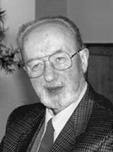|
BIOGRAPHY |
 |
||||||||||||
|---|---|---|---|---|---|---|---|---|---|---|---|---|---|
|
|
|
|
|
|
|
|
|
|
|
|
|
|
|
|
Michel
Leclerc |
Michel LECLERC (Liège 1914 - Waremme 1995) |
||||||||||||||||||||||||||||||||||||||||||||||||||||||||||||||||||||||||||||||||||||||||||||||||||||||||||||||
|
As
an instrumental performer, he gave numerous solo
concerts, participated in recitals or with an
orchestra. He was also very active as a chamber
music performer. He was a member of several
ensembles, including the "Quatuor de la Duchesse de
Vendôme", the "Quintette Instrumental de
Belgique", the "Quatuor Ad Artem" and the Quatuor
of Liège, up until the death of Jean
Rogister. From 1946 to 1976 he was a chamber music
teacher at the Music Academy in Liège and a
teacher of harmony at the Music Academy of Amay.
From 1949, Michel Leclerc was first a music
programmer and then a producer at the RTB (Radio)
Centre of Liège. After
he retired, Michel Leclerc devoted his efforts to
composing only. His vast musical production -
impossible to enumerate comprehensively here -
covers all of the instrumental, orchestral and
vocal fields : one opera ("La Matrone
d'Éphèse"), three ballets ("Noir sur
Blanc", "Le Bouffon amoureux", "Orgueils"),
symphonic works ("Cap Gris-Nez", "Suite au
Passé simple", "Symphonies de Carnaval", two
orchestral suites on the ballet Noir sur Blanc),
concerti with orchestra (violin, viola, horn,
guitar, bassoon, ... ), many instrumental works
with piano ("Hommage à Jean Rogister" for
viola and piano, "Sonatine" for horn and piano,
"Contrastes" for clarinet and piano,
"Lumières et Brumes de Meuse" for trumpet
and piano, ... ), melodies (with texts of Maurice
Carême, of Aldolphe Hardy, of Jean Brumioul,
... ), choral works for speaker, soli, choir et
symphonic orchestra ("Simple Histoire de la
Genèse", "Le Livre de Job", "Le Chemin
Royal", "La Charité-François", ... ),
scenic- or film music ("Jeanne d'Arc", "Ta Mort est
ma Lumière", "Dona Mencia", "L'Aube
nouvelle," ... ), walloon works ("Li Creùs
d'Amour", "Li Vwèle", "So les Vôyes di
Moûse", ... ), Michel
Leclerc always stated himself that he did not
belong to any specific school and he considered
himself to be a typically Walloon impressionist,
independent, humorous, sensitive and
tender-hearted, but also highly irreverent. As a
matter of fact, he wrote very freely and felt close
to all genuine composers, regardless of their
methods of expression and their techniques. On the
other hand, as he declared, the composers who try
to render some "ersatz" for noise and show but
disregard for sensitivity and poetry always
remained strangers where he was concerned. His airy
and percussive orchestration seasoned with some
stridencies, but without exaggeration, reveals a
definite style and a frank, clear and accurate
language. Michel
Leclerc retired to the Senior Citizens Home
"Saint-Charles" at Landenne-sur-Meuse, between
Namur and Huy. He passed away in Waremme on
September 20,1995. Philippe
Bayard |
|||||||||||||||||||||||||||||||||||||||||||||||||||||||||||||||||||||||||||||||||||||||||||||||||||||||||||||||
|
|
|||||||||||||||||||||||||||||||||||||||||||||||||||||||||||||||||||||||||||||||||||||||||||||||||||||||||||||||
|
|
|||||||||||||||||||||||||||||||||||||||||||||||||||||||||||||||||||||||||||||||||||||||||||||||||||||||||||||||
|
|
|||||||||||||||||||||||||||||||||||||||||||||||||||||||||||||||||||||||||||||||||||||||||||||||||||||||||||||||
